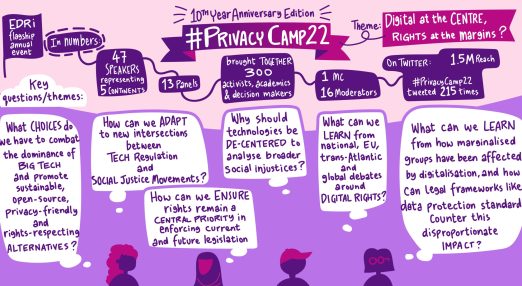EDRi-gram, 9 March 2022
In this edition of the EDRi-gram, we voice the call of 72 civil society organisations to abolish manipulative dark patterns and creepy online ads. We are also urging the international community to provide the necessary support to Ukraine and its human rights defenders to ensure that people are protected from cyber threats.
Filter resources
-

EDRi-gram, 9 March 2022
In this edition of the EDRi-gram, we voice the call of 72 civil society organisations to abolish manipulative dark patterns and creepy online ads. We are also urging the international community to provide the necessary support to Ukraine and its human rights defenders to ensure that people are protected from cyber threats.
Read more
-

EDRi-gram, 16 February 2022
In this edition of the EDRi-gram, we put EDRi's affiliate ECNL in the spotlight to take a peek at the fights they are fighting to advance our freedoms online and offline. We're also looking at a comparison between the Western Balkans countries' digital advancement and what the digitalisation of all aspects of life mean citizens' well-being. We're also exploring the Belgian authority's decision that IAB Europe’s consent pop-ups are incompatible with the GDPR, which has been confirmed by 27 data protection authorities from 20 EU countries involved in the cross-border investigation.
Read more
-

#PrivacyCamp22: Event Summary
The theme of the 10th-anniversary edition of Privacy Camp was "Digital at the centre, rights at the margins" and included thirteen sessions on a variety of topics. The event was attended by 300 people. If you missed the event or want a reminder of what happened in a session, find the session summaries and video recordings below.
Read more
-

EDRi-gram, 2 February 2022
In this edition of the EDRi-gram, we dive into the secret negotiations about Europol's reform that would enable mass surveillance of people and discriminatory predictive policing. We also take a peek at the European Parliament's approval of a rights-respecting Digital Services Act and its proposal to ban the use of sensitive personal data for online ads.
Read more
-

What went down at #PrivacyCamp22?
EDRi’s annual flagship event Privacy Camp took place yesterday, on 25 January, for the first time online. We hope many of you were able to attend and that you found the event just as inspirational as the in-person experience.
Read more
-

EDRi-gram, 19 January 2022
In this first edition of the EDRi-gram for 2022, we look at how people are pushing MEPs to take the opportunity to end surveillance ads. We also explore why it is important for our health data to stay private and how the e-Evidence Regulation threatens the confidentiality of this sensitive information. We also look into what it’s like to have an algorithm as your boss through the stories of millions of people worldwide, working in the gig economy for companies like Uber, Deliveroo, Bolt & Just Eat, who are subjected to unprecedented surveillance.
Read more
-

Booklet: Informing the disinfo debate
Today, 20 December 2021, EDRi, Access Now and Civil Liberties Union for Europe publish a joint report as a continuation of its 2018 predecessor, Informing the “Disinformation” Debate. The main outcome of this report is a set of policy recommendations addressed to the EU co-legislators focusing on: how to effectively mitigate fundamental rights risks that result from the manipulative methods deployed by large online platforms that exploit people’s vulnerabilities and their sensitive data; and how to combat disinformation in a manner that is fully compliant with fundamental rights standards.
Read more
-

EDRi-gram, 15 December 2021
In this last edition of the EDRi-gram for 2021, we look at the good, the bad and the ugly in the much-anticipated Digital Services Act report, approved by the European Parliament IMCO Committee this week. We also take a look back at this year of resilience, reflecting on the impact EDRi and the Reclaim Your Face coalition had on digital rights.
Read more
-

EDRi-gram, 1 December 2021
In this edition, we tell you how you can take your power back from Big Tech companies and help us create a democratic, fair and open internet for a just society. We are also calling on the EU to put our fundamental rights first in the Artificial Intelligence Act (AIA).
Read more
-

Transposition of the Copyright Directive in Spain
The transposition of the Copyright Directive in Spain has been done with no Parliament debate. While the political parties could ask for it, they will likely not do so for fear of conflicting with certain famous artists from the copyright lobby, who are lobbying for an extreme position on copyrights.
Read more
-

EDRi-gram, 17 November 2021
Check out our joint call to the Portuguese government to oppose a proposed law that tries to sneak in biometric mass surveillance. In this edition, we also explain how Facebook's latest announcement about deleting their facial recognition database demonstrates that voluntary self-regulation from tech giants is superficial and cannot replace actual legislation against these practices. And discuss the shortcomings of Facebook whistleblower's testimony.
Read more
-

Big-tech lobby sets the rules about big-tech in Europe
The dominance of Google and Facebook is disastrous for the public debate online. We've been saying this for a long time. But this dominance can also be felt in the regulation of the same platforms. Huge amounts of money are spent by big tech to influence European laws and regulations.
Read more
